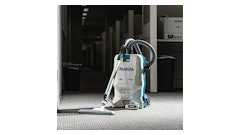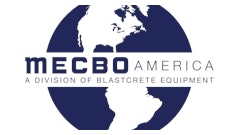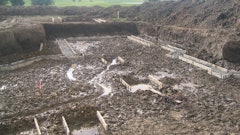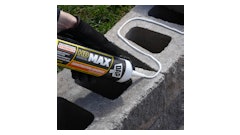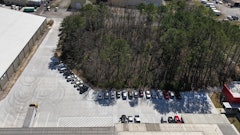
When Luke Secrest and Andy Rehner started The Basement Guys, they knew they wanted the company to be different.
"We realized we could do things better," says Secrest, the company president. "We didn't want to be like other construction companies."
The two had met as salespeople at another construction company, and Secrest had spent his entire life around the construction industry. They started in 2000 with a "pickup truck and two shovels," says Rehner, but expect revenue to hit $4.5 million this year.
From the beginning, the company's focus has been on quality work, a dedication to customer service and a systems approach that allows the business to grow quickly but still maintain those core principles.
"A good judge of a company is if there is a problem, how do they handle it?" says Rehner, the company's general manager. "If there's any inkling of a problem, we're on it like bulldogs and fix it immediately."
Building a good reputation has been a key part of the company's rapid growth.
"People are happy to have a good experience," Rehner says. "A lot of that leads to referrals."
Selling direct
One of the major things that sets The Basement Guys apart from other companies is that they sell directly to the homeowner instead of working as a subcontractor to a builder or general contractor.
"We chose to work with the customers directly because we weren't willing to rely on someone else for business," Secrest says. "GCs control your profit margin, they don't pay you on time – it puts you in a bad situation."
Besides the financial benefits, working directly with homeowners is also more rewarding, Rehner says.
"You have a happy customer at the end," he says. "You've come in and fixed their problem."
While it allows them more control, selling directly to the homeowners requires a large investment in advertising and marketing to make sure people hear about the company. Generating new leads is important because about 80 percent of the company's jobs are new customers, with 20 percent from repeats and referrals.
The Basement Guys advertise in the Yellow Pages, on television and radio and in print. The company has also invested heavily in its website, an increasingly important part of its marketing efforts.
"This is the first year we've taken money from some of the older methods and moved it over to the website," Secrest says. "We're still spending a lot more money with traditional advertising, but the Web is a growing part of our plan."
The website is also an effective way of educating the consumer.
"They already have an idea what they're going to see and if we're the right company for them," Rehner says. "Forty to 60 percent of my job is done when I get to their house to make the sale."
The company has also taken the unusual step of hiring a public relations firm that gets the word out about their business and projects, leading to free publicity.
"We've gotten a lot of articles and stories in the local media thanks to what they do," Rehner says.
Once they capture the lead, the company still needs to make a sale. This is one of the areas where the company's systems kick in. Incoming phone calls go into a phone room that is staffed by two to four employees specially trained to talk to potential customers. They have a form that leads them through all the important information they need to gather. They then set an appointment for the homeowner to meet with one of the company's salespeople based on compatibility with that salesperson. For example, if somebody is from a certain suburb, they'll send a salesperson from that area if they have one.
"We also find that one salesperson sells certain jobs better than other types," Rehner says. "For example, we have guys that are going to be better able to sell jobs when the customer has been to our website. We want to put them in a position to make the most of the appointment."
Diversified growth
While a focus on customer service is important, a key part of The Basement Guys' growth is that the company has diversified to offer a variety of services that customers were looking for.
What started as a waterproofing and foundation repair company has expanded to include driveways, patios, piering and excavating. In 2003, The Basement Guys purchased Secrest Excavating, a company owned by Secrest's father, Bob, who now runs the excavation division.
"We were already his biggest customer, so it just made sense," Secrest says. "He didn't want to close the business, so this way we all get value from it."
By offering these additional services, the company has been able to do more work for past customers and expand its presence in the market, he says.
Besides bringing Bob Secrest onboard, the makeup of the company has also changed in other ways. Rehner sold his stake in the company to Secrest, but has stayed on board as the general manager and now runs the new Toledo office. Since then, Secrest's brother, Doug, has come in as installation manager and now owns half of the company.
Managing growth
One of the axioms of the construction business is that companies don't often go out of business because there's not enough work. The problem is managing that work. Often when companies grow quickly, quality suffers. Making sure that doesn't happen is a priority for The Basement Guys.
"We've worked very hard to put systems in place to establish a consistency of quality," Rehner says. "As long as people follow the system, we don't have any lapses in quality."
The company has its own specialized system for how they do every kind of work, Secrest says, so they prefer to hire people who do not have previous experience at another company.
"We don't want them coming in knowing some other way of doing it," he says. "It's easier to teach someone who doesn't know how to do the work than it is to undo the training they've gotten somewhere else."
Because they invest so much in systems and training, keeping employees is a priority. One advantage the company has over many contractors is that they are kept busy all year long, meaning no layoffs in the winter. When it's too cold to pour concrete, employees can be kept busy working on indoor waterproofing and repair projects.
"We keep our good employees because we have a good work environment," Secrest says. "We offer them the kind of things they can't find elsewhere, like health insurance and 401k."
Managing cash flow can also be an issue for many growing businesses, something Secrest and Rehner were quick to recognize.
"We know money is not our strongpoint," Secrest says. "So we brought in a very good CPA firm. They have audited us and told us where we're not making money."
By having a good knowledge of the dollars and cents, the company can keep a firm grasp on job costs.
"You have to know how much you need to make a profit," Rehner says. "It sounds obvious, but a lot of people just don't know. If you can't do it, hire a qualified person to handle it for you."
Once you know the costs of doing business, having a written business plan makes it easy to plan for future growth, Secrest says.
"When we're planning, we look at what is realistic based on past years' performance," he says. "We break it down based on number of jobs, leads and appointments.
"Because we know how many leads turn into appointments and how many appointments turn into jobs, we can figure out how much we have to spend in advertising and marketing."
The company has a two-year business plan, but they constantly revisit it to make sure it still makes sense.
"It's something you need to look at every day, every week, reading and rewriting as the year goes on," Rehner says.
As for the future, the company is at an important time in its growth, Secrest says.
"At this point, we have to decide if we're going to be one of the big fish in the industry," he says. "In the next five years, we should have enough locations to cover the entire state of Ohio."
Besides the Toledo office, the company plans to soon open a Cincinnati office and is looking at other markets for expansion in the region. And the company is in the process of moving out of its Columbus headquarters into a new 8,000 sq. ft. building with two acres of property.




